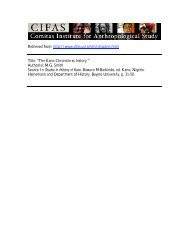e - CIFAS
e - CIFAS
e - CIFAS
Create successful ePaper yourself
Turn your PDF publications into a flip-book with our unique Google optimized e-Paper software.
++ GOVERNMENT IN ZAZZAU<br />
mallam's order formed a self-contained promotional series. Apart<br />
from the order of mallams, there were only two other orders<br />
entirely staffed by persons of the same status condition. These<br />
were the order of chamber o.fficials and the order of slave-ofUcials.<br />
Both these orders of chamber offici.als and titled slaves were of<br />
instrwnental rather than political significance for the system of<br />
government.<br />
Another point mentioned in the preceding summary which<br />
requires further discussion concerns the functional groupings of<br />
office of various orders of rank, taken separately or together. The<br />
Madawaki (or Madaki as he is called in Fulani Zazzau, both fonns<br />
being abbreviationi'l of Mai-dawaki, the 'owner of the horses', that<br />
is, commander of cavalry) acted as commander-in-chief, receiving<br />
half the booty of war or slave-raids for distribution to the public<br />
officials. All free title-holders of Madawaki's group, namely, the<br />
Kuyambana, Garkuwa Babba, Makama Babba, Lifidi, and<br />
Shenagu, had military duties, and were prominently concerned<br />
with the direction of war. But the Madawaki also had two subordinate<br />
slave ,.atouna, the Wagu and the Sata. Wagu was the title<br />
of the royal sexton, and his position directly under the Madawaki<br />
is explained by the latter's role as head of the electoral council, as<br />
well as his duty as commander-in-chief, responsible for the care of<br />
the royal mausoleum. The other slave subordinate of the Madawaki,<br />
the Sata, had the function of supervising the order of slaveofficials,<br />
a duty which was shared by Hauni, who acted on behalf<br />
ofthe household officials under Sarkin Fada, Madawaki's principal<br />
opponent in council. Duplication of this supervision of slaveofficials,<br />
and the division ofthese duties between the Madawaki and<br />
the Sarkin Fada, was clearly.a protective political device. It simultaneously<br />
ensured that the order of official slaves would be closely<br />
controlled and also that neither the public nor the household<br />
officials would be able to subvert these titled slaves, or bring them<br />
into the arena of political competition. This division of supervisory<br />
functions which neutralized the slave order politically<br />
thereby defined it as a purely administrative staff.<br />
The Galadima's duties in the field of civil administration contrast<br />
directly with those of the Madawaki, and this contrast was<br />
further underlined by their differences in social status, the Madawaki<br />
being a freeman, the Galadima a eunuch. The principal<br />
subordinates of Galadima controlled markets, the supply of meat,<br />
GOVERNMENT IN NINETEENTH-CENTURY ABUJA 4S<br />
exercised jurisdiction over unmarried mothers, and officiated at<br />
royal weddings. The Galadima himself was in charge of the state<br />
police, and his compound served as the place for punishment of<br />
offenders. In the war camp, the Galadima's deputy was the Dallatu,<br />
another eunuch of rukuni rank, who acted as head of the anny's<br />
civil administration, while the Barwa, a slave-official of ,.awuna<br />
rank, subordinate to the Galadima, was in charge of the royal<br />
encampment itself. The Galadima did not proceed with the army<br />
on its campaigns, but remained inAbujatown, as the king's deputy,<br />
and was head of the civil administration during wartime. The<br />
capital was divided between the Galadima and the Madawaki for<br />
administration, each ruling one-half as a fief. This served to<br />
neutralize it politically, just as division of control over the slaveofficials<br />
neutralized that order politically. Division of the capital<br />
between Galadima and Madawaki denied either the chance to seize<br />
power by (;OUP without the other's consent; and as the Galadima<br />
was a eunuch, already enjoying a high authority but unable to<br />
perpetuate peri'lonal power, this meant in effect that the Galadima<br />
could be relied on to side with the king against the Madawaki's<br />
personal ambitions. In so far as the Madawaki's aims were less<br />
personal, but reflected matters ofgeneral policy, then the Galadima<br />
was free to support him in council, in association with or in opposition<br />
to the Sarkin Fada. An instance which is discussed later<br />
illustrates neatly how valuable was this administrative division of<br />
the capital at Abuja between the civil and military chiefs. This is<br />
the story of a non-eunuch Galadima of Fulani Zaria who enjoyed<br />
undivided administrative control of the capital at a period when<br />
the king and the Madaki were mutually opposed, and who was<br />
tempted by these circumstances to rehellion.<br />
Four of the Abuja rank-orders contain functional divisions of<br />
offices in terms oftheir special military or civil interests and duties.<br />
Within each of these rank-orders, the relations between these<br />
functionally differentiated official groups have a similar structure,<br />
and this pattern is also duplicated for the system of rank-orders as<br />
a whole. Each of these functionally differentiated segments has an<br />
internal hierarchy ofits own, these hierarchies expressing authority<br />
relations among their component offices; and each of these<br />
functional hierarchies is in contraposition with the other as administrative,<br />
political, and promotional units. In a state known<br />
historically to have been almost continuously engaged in military





